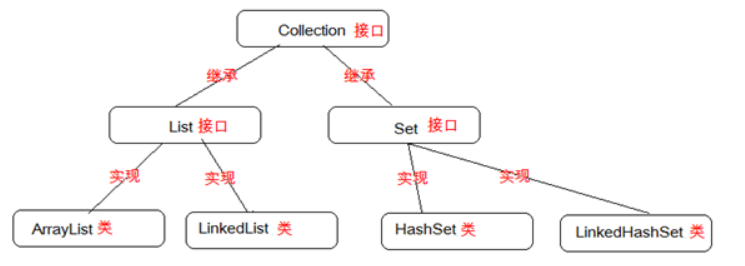集合:
集合是java中提供的一种容器,可以用来存储多个数据。
数组的长度是固定的。集合的长度是可变的。集合中存储的元素必须是引用类型数据
Collection接口常用的子接口有:List接口、Set接口
List接口常用的子类有:ArrayList类、LinkedList类
Set接口常用的子类有:HashSet类、LinkedHashSet类

import java.util.ArrayList;
public class Demo01 {
public static void main(String[] args) {
/*ArrayList<Integer> arr=new ArrayList<Integer>();
arr.add(1);
arr.add(0);*/
ArrayList<Person> arr=new ArrayList<Person>();
arr.add(new Person("小红帽",25));
arr.add(new Person("大灰狼",24));
arr.add(new Person("光头强",21));
for(int i=0;i<arr.size();i++){
System.out.println(arr.get(i));
}
}
}
import java.util.ArrayList;
import java.util.Collection;
public class Demo02 {
public static void main(String[] args) {
Collection<Integer> col=new ArrayList<Integer>();
col.add(10);
col.add(20);
//清空集合
//col.clear();
//判断集合中是否包含该元素
boolean flag=col.contains(20);
System.out.println(flag);
//根据值删除集合中的元素
col.remove(10);
//遍历
if(col instanceof ArrayList){
ArrayList<Integer> arr=(ArrayList<Integer>)col;
for(int i=0;i<arr.size();i++){
System.out.println(arr.get(i));
}
}
//将集合转为数组
Object[] obj=col.toArray();
for(int i=0;i<obj.length;i++){
System.out.println(obj[i]);
}
}
}
迭代器:
在取元素之前先要判断集合中有没有元素,如果有,就把这个元素取出来,继续在判断,如果还有就再取出出来,这种取出方式专业术语称为迭代。
import java.util.ArrayList;
import java.util.Collection;
import java.util.Iterator;
public class Demo04 {
public static void main(String[] args) {
Collection<Integer> col=new ArrayList<Integer>();
col.add(10);
col.add(20);
col.add(30);
//用迭代器遍历
//获取迭代器对象
Iterator<Integer> it=col.iterator();
//判断集合中是否有下一个元素
while(it.hasNext()){
System.out.println(it.next());
}
}
}
import java.util.ArrayList;
import java.util.Collection;
import java.util.Iterator;
public class Demo05 {
public static void main(String[] args) {
Collection col=new ArrayList();
col.add("abc");
col.add("bcd");
col.add("efg");
//获取迭代器对象
Iterator it=col.iterator();
//判断集合中是否有元素
while(it.hasNext()){
//获取每个元素
Object s=it.next();
//判断元素是否是String类型
if(s instanceof String){
//向下转型
String str=(String)s;
//调用子类独有的方法
System.out.println(str.length());
}
}
}
}